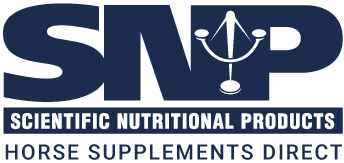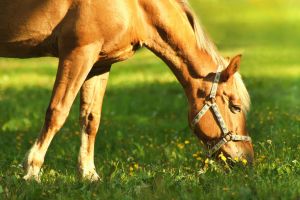Balancing a horse’s diet while meeting the digestible energy requirements is extremely important. Each and every horse requires specific nutrients dependant on their age, workload and their access to good quality pasture. Nutrient content should be considered when looking at the overall feeding program, so Scientific Nutritional Products takes a look at what nutrients our horses need and why. The nutrients a horse requires include macro nutrients water, protein, fats and carbohydrates and micro nutrients vitamins and minerals. The quantity of nutrients is dependent on the equine’s weight, workload and whether they are still growing or currently in foal or lactating. A youngster, mare in foal or a horse in hard work require higher quantities of feed and nutrients whilst the leisure horse often needs less sustenance to maintain good condition simply because their lifestyle does not "burn" as many calories. Nonetheless it is important to remember even the grazing horse requires good quality vitamins and minerals to maintain optimum health and wellbeing. Water Water is by far the most important nutrient, and is most often overlooked. All horses should have access to fresh, clean water at all times. Without it, colic, dehydration, and even death could result. In general, a 500 kg horse will drink approximately 30–45 litres per day. It is important to bear in mind that grass has significantly higher water content than dry hay so during prolonged stabled time it is important to maximise your equine's access to water. Protein Protein’s main function as a nutrient is to provide the building blocks for tissues, muscle, hormones, and enzymes. With respect to equine diets, we often classify protein requirements based on quantity and quality. Protein quality refers to the amino acid make up of a feed. Some amino acids can actually be made by the body and are not essential from a dietary standpoint. Amino acids that cannot be produced by the body, such as lysine, are considered essential and must be provided for in the diet. Good-quality sources of protein include soybean meal or linseed/flaxseed and legumes; alfalfa, clover hays. Carbohydrates and Fat Carbohydrates and Fats generate energy through being metabolized. Specific types of carbohydrates and fats serve additional important functions for the horse. For example, complex carbohydrates such as fibre are extremely important for digestive tract health. Furthermore it is now recognized that some types of fats are essential parts of the diet; namely the omega fatty acid group, including omega-3 which can be provided through oil or a supplement including the range available from Scientific Nutritional Products. Vitamins and Minerals Vitamins and Minerals are necessary in small quantities for good all round general health. Vitamins and minerals play a multitude of roles within the body including supporting the immune system, bone and teeth structure, benefiting eyesight and assisting nerve and muscle function. Horse & Pony Multi-vitamin Supplement includes over 25 essential vitamins and minerals providing equine's everything they need for health and well being. The palatable powder supplement can be easily added to small amounts of feed, such as a low calorie chaff and is ideal for those equine's in rest or light work. Competition Horse Supplement contains over 30 essential nutrients, creating the ideal supplement to the diet of a competing equine. Offering all the micro nutrients required in order to balance the diet and undertake a busy lifestyle, Competition Horse Supplement helps to maintain peak condition and provides "that little something extra", so horses can produce their best performance. To find out more about Horse & Pony Multivitamin Supplement, Competition Horse Supplement or any of the wide range of equine and canine supplements available from Scientific Nutritional Products visit their website www.horsesupplementsdirect.co.uk


